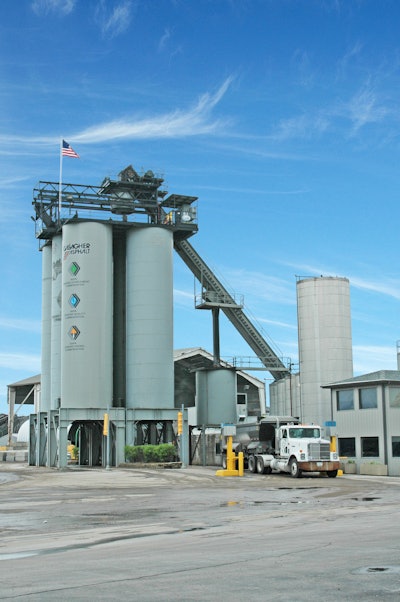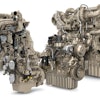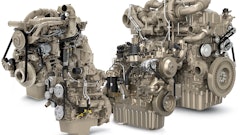
Founded in 1928 by James F. Gallagher, Sr. and now in its third generation of family management, Gallagher Asphalt has produced asphalt and paved or resurfaced thousands and thousands of miles of pavement.
With state-of-the-art, high-capacity asphalt plants strategically positioned in key south Chicago suburban locations, Gallagher Asphalt efficiently services commercial and industrial customers throughout more than 3,000 square miles.
Serving customers throughout Southern Cook, Will, and Northern Kankakee counties in Illinois, Gallagher is equipped to handle:
- Highways
- Subdivisions
- Shopping malls
- Commercial parking facilities
- Industrial drives, roads and loading bays
- High-speed, surface-critical racetracks and more
- Intermodal facilities
The company offers numerous services including asphalt paving, grading, milling, hot-in-place recycling, stone and base work. It also offers testing services through its Chicago Testing Laboratory division (see sidebar).
On the production side, its mixes include Illinois DOT (IDOT) conventional dense graded, SMA, neat and polymer, pervious pavement, HMA and WMA, private/commercial mixes, and cold mixes for pothole patching.
On average the company produces between 600,000 and 1,000,000 tons a year at its three plants in Thornton, Joliet and Bourbonnais.
New Transporter system
Gallagher prides itself on offering customers a blend of the latest technology (GPS, lasers, sonar) in its paving operations and a dedication to quality, efficiency and reliability at its production facilities.
With that mission in mind, the company’s flagship facility in Thornton underwent numerous upgrades over this past winter.
“We try to keep our plants equipped with the latest technology where it provides us tangible benefits,” says Jim Trost, vice president of operations at Gallagher Asphalt. “Our most recent upgrades were done to improve quality, cost savings or safety, or a combination of all three.
“Illinois is specifying more jobs with Percent Within Limits (PWL) specifications,” he says. “So, we’re getting paid according to test results. Consistency is a big deal and we have to be good at it.”
One of the most impressive upgrades Gallagher made to this facility was incorporating the Maxam Transporter bin top conveying system, which was introduced at World of Asphalt in 2012. The system, which is only one of two in the U.S., incorporates a moving batcher that rides on rails and eliminates troubles associated with drag conveyors and diverter gates.
The Transporter system uses a stationary batcher fixed to the main drag slat conveyor. As the stationary batcher fills, a limit switch opens its gate to discharge the material into the transport/mobile batcher.
When the stationary batcher is empty, the stationary batcher gate closes and the mobile batcher is on its way to whichever bin the plant operator has selected to fill. As the mobile batcher approaches the bin, the bin top seal opens to accept the delivery. Once verified that the mobile batcher is in the correct position, the batcher gate opens and discharges the material into the selected silo. The mobile batcher then returns to the stationary batcher to receive the next load.
For Gallagher’s Transporter system, which was customized for its facility, both the stationary and mobile batchers each feature 6-ton capacities. The facility now has six storage silos.
“The new system eliminated four existing 600-tph transfer conveyors, four diverter gates, and five silo batchers,” explains Steve Caraway, plant manager. “We no longer have to maintain/replace chains, slats, sprockets, floors, divert gates, actuators and all the other wear parts associated with traditional drag conveyor systems. We’re expecting an annual maintenance savings of about $20,000 with the elimination of these components.
“The new system will also result in about $14,000 per year in electrical savings as well due to reduction in drive motors and transfer conveyor heating,” he continues. “The Transporter will also generate electricity about 50% of time during the braking phase of the operation.”
Additional upgrades
Gallagher emphasizes its impact on the environment by using innovative asphalt recycling processes in both its paving and production practices.
With that in mind, another new upgrade to the Thornton facility is a dual high-frequency RAP screening system manufactured by Inertia Machine Corp. with a Telestacking conveyor produced by Thor Global Enterprises. Gallagher recycles asphalt from many of their projects.
The new screening system features twin double-screen decks and produces two product sizes, 3/16” minus (fine) and ½” x 3/16” (coarse). The screener produces 300 to 325 tph of combined finished product.
After separating, the fine material goes to the automated telestacking conveyor and straight to a covered storage building. The conveyor moves back and forth to evenly distribute material while building the pile, limiting segregation and eliminating rehandling with a wheel loader.
“The new screening system improves consistency and creates less waste,” says Trost. “We also switched the crusher power from diesel to electric because the asphalt plant environment is hard on the diesel engines. That gave us additional cost savings from the reduced fuel/power cost, labor savings from refueling, and less maintenance on the machine. It’s also a much quieter operation now.”
Gallagher also implemented advanced burner control systems for its dryer drums in the HMA/WMA plants. This allows individual control to fine tune and optimize operation of the burner through the full range of operation and save energy. Trost says the estimated the energy savings on the advanced burner controls is about 5%.
“We’re saving a lot of energy with these upgrades,” says Trost. “So much so that we’ve been able to get the local utility companies (natural gas and electric) to participate in the funding of the burner controls and transporter projects through their energy efficiency incentive programs.”
Other upgrades at the Gallagher facilities:
- Fines control system – to improve quality of the mix by controlling the fines
- Warm mix foaming system – 90% of the WMA produced by Gallagher is foamed
- Weigh feeders for precise RAS feed control; RAS now also has a covered storage area
- RFID ticketing/loadout systems with cameras, automatic truck bed sprayer systems and traffic control signals integrated with the loadout to improve safety and efficiency
- Dryer system for plant air for reliable operation of pneumatic actuators with enclosures to reduce noise levels
- Electric hot oil systems and tank heat for improved reliability and reduced cost
- Additional silo storage
- Secondary containment for storage tanks and tank truck unloading
- Fines disposal auger with water addition
- Installation of stairs, ladders, walkways, platforms for safe access to critical areas of the plant
Challenges
The myriad upgrades has helped Gallagher Asphalt meet some of its efficiency, consistency and cost savings challenges, but like many asphalt contractors, funding is also top of mind. The recently passed highway bill gives some comfort, but it may not be enough.
“With the highway bill, there is some peace of mind knowing that we will receive stable funding for the next six years on the federal level, but we still need to see a capital bill from Illinois for sustainable funding,” says Dan Gallagher, who along with Charlie and Patrick Gallagher, is one of the principal owners of the company.
“Without something substantial on the state level, we still feel nervous about what the future holds in Illinois,” he continues. “Coming off the Great Recession, we find that there is still an over capacity in the industry. This limits opportunity other than acquisitions.”
Another lingering challenge that faces the company is finding qualified people that fit within the company’s culture, says Gallagher.
“In our area, well-paid union workers help this issue a bit, but it’s still a challenge,” says Gallagher. “The fourth generation of Gallaghers is now starting to work for us, and recruiting quality workers is at the top of their list.”
Gallagher Asphalt does offer an internship program to help expose potential employees to the asphalt industry. “It’s twofold,” says Gallagher. “They learn our industry and our business, and we also get to know them to see if they fit with our company culture.”
Regardless of today’s funding and employee challenges, Gallagher Asphalt is poised for a bright future.
“We’re always looking for new ways to create cost savings and improve efficiencies,” says Gallagher. “We’re now incorporating GPS in all our trucks to identify operation inefficiencies and control costs. The next step is to automate the log sheet and give plant operators access to where trucks are and when they’ll be either at the plant or the jobsite to improve operational efficiencies.”
With its emphasis on technology and creating the best product, there is little doubt that Gallagher Asphalt will remain at the front of the pack in this very competitive market.















